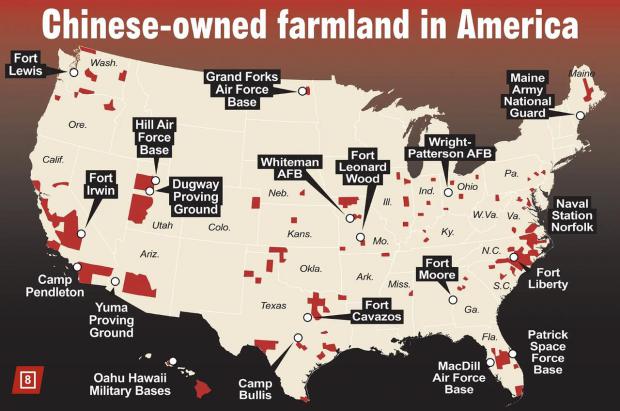
Breaking News
 High-Level Sources: Covert War In US, Israeli & Foreign Intel Agencies, Behind Epstein Case...
High-Level Sources: Covert War In US, Israeli & Foreign Intel Agencies, Behind Epstein Case...
 Hegseth Hosts Netanyahu at the Pentagon, Says It Was an 'Honor' To Be Part of the War Agains
Hegseth Hosts Netanyahu at the Pentagon, Says It Was an 'Honor' To Be Part of the War Agains
 Saagar Enjeti on the Dangerous New Developments in Pam Bondi's Epstein Cover-Up
Saagar Enjeti on the Dangerous New Developments in Pam Bondi's Epstein Cover-Up
 Does Elon Musk's Third Party Have a Prayer? Trump Is Not a Believer
Does Elon Musk's Third Party Have a Prayer? Trump Is Not a Believer
Top Tech News
 Insulator Becomes Conducting Semiconductor And Could Make Superelastic Silicone Solar Panels
Insulator Becomes Conducting Semiconductor And Could Make Superelastic Silicone Solar Panels
 Slate Truck's Under $20,000 Price Tag Just Became A Political Casualty
Slate Truck's Under $20,000 Price Tag Just Became A Political Casualty
 Wisdom Teeth Contain Unique Stem Cell That Can Form Cartilage, Neurons, and Heart Tissue
Wisdom Teeth Contain Unique Stem Cell That Can Form Cartilage, Neurons, and Heart Tissue
 Hay fever breakthrough: 'Molecular shield' blocks allergy trigger at the site
Hay fever breakthrough: 'Molecular shield' blocks allergy trigger at the site
 AI Getting Better at Medical Diagnosis
AI Getting Better at Medical Diagnosis
 Tesla Starting Integration of XAI Grok With Cars in Week or So
Tesla Starting Integration of XAI Grok With Cars in Week or So
 Bifacial Solar Panels: Everything You NEED to Know Before You Buy
Bifacial Solar Panels: Everything You NEED to Know Before You Buy
 INVASION of the TOXIC FOOD DYES:
INVASION of the TOXIC FOOD DYES:
 Let's Test a Mr Robot Attack on the New Thunderbird for Mobile
Let's Test a Mr Robot Attack on the New Thunderbird for Mobile
 Facial Recognition - Another Expanding Wolf in Sheep's Clothing Technology
Facial Recognition - Another Expanding Wolf in Sheep's Clothing Technology
"Get The Hell Off American Agriculture": U.S. Moves To Ban Farmland Sales to China

Agriculture Secretary Brooke Rollins announced the policy shift Tuesday, saying the administration is preparing an executive order and working with state lawmakers to block further land purchases, especially near military bases.
"With this announcement today we are taking this purpose and our American farmland back," Rollins said. "American agriculture is not just about feeding our families but about protecting our nation and standing up to foreign adversaries who are buying our farmland, stealing our research and creating dangerous vulnerabilities."
In a joint press conference with Defense Secretary Pete Hegseth and Homeland Security Secretary Kristi Noem, Rollins said officials are exploring "every available option" to potentially claw back land already purchased by China-linked entities.
Though Chinese investors hold a tiny fraction of U.S. farmland—about 0.0003%, most of it tied to a single company—the issue has drawn bipartisan scrutiny amid rising geopolitical tensions. The USDA said Chinese-linked land ownership has declined by 31% since 2021, and federal authorities have documented attempts by Chinese agents to target U.S. agriculture, including a recent case involving smuggled crop-damaging fungi.
Defense Secretary Hegseth said, "No longer can foreign adversaries assume we're not watching," adding that the Pentagon will work to block land sales near military installations. "Especially in a contingency," he said, "we must secure the food supply for our soldiers."
The MSN/WaPo article says that the announcement follows state-level actions like Arkansas's 2023 order forcing Chinese-owned Syngenta to sell 160 acres, and Florida and Montana's bans on land sales near sensitive infrastructure.
Critics argue these land purchases could give adversarial governments leverage over America's food supply. Though Canada holds the largest share of foreign-owned U.S. farmland, Chinese firms now control about 0.5% of it.
Several bills in Congress seek to tighten oversight, including the Agricultural Risk Review Act, which would require the USDA to monitor farmland acquisitions by adversarial nations, and the bipartisan Farmland Act, which calls for federal review of large foreign land deals and the creation of a public database.
Rollins also said the USDA has already cut ties with 70 individuals and 550 entities linked to "countries of concern" in research and contracts, though no further details were provided.
Amid concerns about surveillance, scrutiny intensified following a 2022 land purchase in North Dakota by a Chinese firm just 12 miles from a U.S. Air Force base. That deal was eventually blocked, but it exposed gaps in existing rules.



